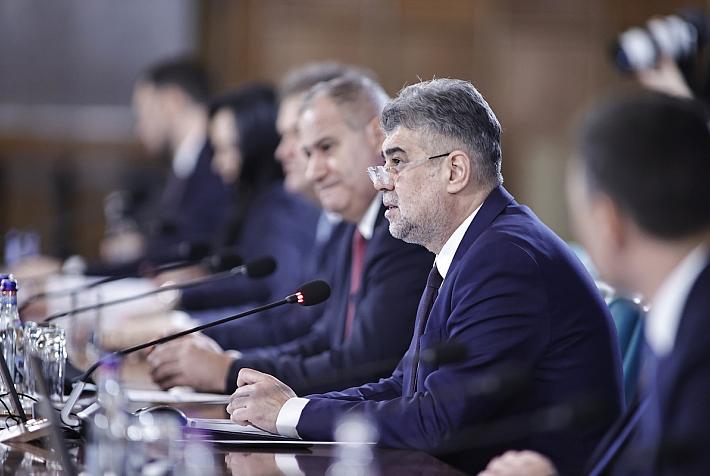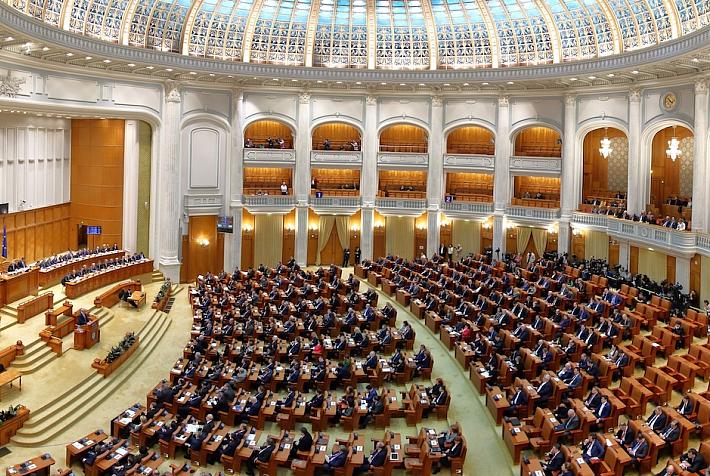AmCham Romania launches the 7th edition of "Priorities for Romania," outlines the vision and recommendations for sustainable development during 2024–2028

-
Joining the OECD, macro-budgetary balancing, an efficient and high-performing education system, a framework for attracting investments, and the continuation of transport infrastructure projects are the strategic objectives of the 2024-2028 mandate.
-
The next mandate is the last window of opportunity for Romania to reduce the gaps with the EU average by maximizing funding from European sources.
-
Romania's competitiveness is still affected by a series of systemic factors that limit potential economic growth and the capacity to face future crises and challenges.
In the context of the general elections at the end of 2024, AmCham Romania launches the 7th edition of Priorities for Romania, the document that outlines the vision and recommendations for the economic agenda in the 2024-2028 mandate. Through this initiative, AmCham Romania calls the attention of future decision-makers to the topics that the business community considers central because of the debates in the period leading up to the elections and in the governing plans proposed for the next four years.
"AmCham members are concerned with the present but also with the future, with the evolution of the economy and society in the medium and long term. This is the perspective of this year's edition of the programmatic document Priorities for Romania. We aimed to answer two essential questions: what progress Romania has made in the past four years, and what remains to be done so that the end of the next term finds Romania in the development stage we all want? In this edition, we have included the most relevant public policy interventions from AmCham's perspective. We are confident that timely and efficient implementation of the recommended reforms and investments will lead Romania where it belongs: towards OECD membership, in a leadership position in the region, with an important role in Ukraine's reconstruction, among the top 10 economies in the EU, and towards strengthening economic relations with the U.S.," emphasized Cristian Sporiș, AmCham Romania President.
Priorities for Romania 2024 – 2028 structure the vision and strategic directions of AmCham members for the next four years, integrating the recommendations we constantly advance in dialogue with decision-makers. The document considers the global and regional context, mega-trends that are driving transformations in the global economy that Romania cannot ignore, as well as the national objectives Romania has assumed internally and in relation with its international partners.
"We draw attention to the biggest risks but also highlight the opportunities. These are the last years in which Romania will have access to significant financing for convergence with the EU, but also crucial years for setting a sustainable fiscal-budgetary trajectory. The 2024-2028 term overlaps with the years leading up to the 2030 horizon, for which ambitious targets in sustainability and environmental protection have been assumed. During these years, new technologies will have reached levels of maturity that will accentuate their large-scale impact, and Romania must significantly accelerate its pace to catch up with the gaps. 'Priorities for Romania' is AmCham Romania's call for the assumption at all decision-making levels of national objectives and for sustained, responsible, and coordinated implementation. It is essentially a call for vision, immediate action, and a focus on the future," emphasized Daniela Nemoianu, Vice President of AmCham Romania.
The report addresses general national objectives, but also 10 key sectors that are interconnected. Progress in one of these areas will catalyse major improvements in the others. One of the main messages of this edition is that to achieve real and sustainable progress, Romania needs a coordinated, synergistic approach that ensures progress in multiple sectors.
"The upcoming years carry a sense of urgency, not just to reduce disparities but also to transform unprecedented technological progress into real prosperity for society and the economy. Not to be overlooked, Romania finds itself in the most complicated regional context of the last three decades, and the next few years will be crucial not only for strengthening national security but also for reinforcing its geostrategic role within NATO. To manage this context, Romania needs a clear and sustainable strategic vision for the medium and long term. Every sectoral strategy, public policy, and decision must integrate opportunities, anticipate global trends, and minimize macroeconomic risks," declared Dinu Bumbăcea, Vice President of AmCham Romania.
The five overarching objectives AmCham advances in this edition are related to strategic areas, and to achieve them, we recommend:
- Continuing reforms to align economic and social policies with OECD standards, is essential for increasing competitiveness and attracting investments. As an OECD member state, Romania will benefit from access to the experience and expertise of other members, enabling the development and adjustment of public policies that support the implementation of effective reforms, especially in essential areas such as education and healthcare. Modernizing Romania's economy will lead to an improvement in the country’s rating, which will, on the one hand, increase investor confidence and attract foreign direct investments and, on the other hand, facilitate access to external financing by reducing borrowing costs.
- Macro-budgetary balancing and a new model of economic convergence. The real convergence process of the Romanian economy toward the European Union average has accelerated over the past two decades, but Romania's competitiveness is still affected by several systemic factors. Among the most concerning is the deepening of macroeconomic imbalances, specifically the substantial increase in the public budget deficit and the current account deficit, which has not been mitigated even by the good economic performance of recent years. The low tax collection rate is the result of several factors, such as tax evasion, a significant informal economy, and a tax administration system that requires reform and digitalization. Borrowing to finance current state expenses, especially for wages, social security, and pensions, becomes problematic when these are set at levels disproportionate to the strength of the economy and public revenues collected. Romania’s greatest needs are investments in the development of transport, energy, and digitalization infrastructures, in education, healthcare, and for supporting research and development.
- Education, the guarantee of the development of other social and economic structures. Education is a fundamental responsibility and the starting point for any model of economic and social development. Access to quality education and aligning educational policies with labor market needs are sine qua non conditions for positive economic dynamics. In the unfavorable context of demographic evolution (migration, aging population), the existence of an educational system that develops future skills is imperative for the sustainability of public finances, supporting the labor market, reducing social inequality, and implementing any serious national project. The main challenges of the education system that Romania must overcome are functional illiteracy and early school dropout.
- Transport infrastructure to increase mobility, access, safety, and economic competitiveness. Sustainable and sustained economic growth cannot exist without an extensive, interconnected, resilient, and safe transport system. The infrastructure deficit is one of the main factors that has led to the loss of numerous business opportunities, with private investments being directed to neighboring countries. Romania is, in these years, in a race against time to complete the delayed projects of recent decades. Therefore, we recommend multi-annual budget planning for large investment projects in transport infrastructure. In line with the objectives of the green transition, efforts must be made to strengthen expertise and administrative capacity for preparing, managing, and monitoring railway infrastructure projects.
- Attracting and supporting investments in Romania, focusing on high-value-added investments. Capitalizing on the country's potential to attract foreign direct investments (FDIs) requires a well-defined strategy. In a global environment marked by uncertainties and fierce competition for capital, it is essential to prioritize the attraction of investments that transform Romania into a regional production hub. Adopting best practices from the region and implementing policies that encourage innovation, and competitiveness will contribute to sustainable growth and long-term strategic positioning. Implementing a state aid scheme dedicated to strategic investments with a value of over EUR 100 million is essential for Romania to become a regional hub for various industries, thereby strengthening its position within the EU and on the global economic scene. Romania needs such an agency to fulfill its declared mission through concrete and effective actions.
Priorities for Romania 2024 – 2028 also proposes a series of sectoral objectives and measures for areas where AmCham Romania members are active, but also relevant for the entire economy.
For each of the 10 sectors, the main recommendations target directions such as:
- Taxation
In line with the recommendations regarding macro-budgetary balancing, those related to fiscal policy reflect the need for measures to reduce the budget deficit and public debt. For the 2024 – 2028 period, the priorities we consider include returning to a single tax rate system, applying fairly and uniformly, increasing tax collection, optimizing the digitalization of the tax system, implementing multi-annual budgeting, eliminating the minimum turnover tax, and stimulating research, development, and innovation activities.
The direction and pace of implementation for each of these will impact Romania's economic competitiveness, efforts to position itself as a regional investment hub, and ability to face global transformations and increasingly complex challenges.
- Digital Economy
To recover the gaps in key digitalization areas, Romania must accelerate digital transformation and transition towards an innovation-driven growth model. In this regard, it will be very important to make the most of the EUR 6 billion available through the National Recovery and Resilience Plan (NRRP) to develop 5G infrastructure, cloud systems, and digital public services. To avoid delays and fragmented responsibility in delivering strategic projects, we emphasize the need for coordinating institutions led by experts in the field, entrusted with adequate funding, personnel, and decision-making power.
The recommendations also target other critical aspects, such as increasing the digital skills of the population, increasing the number of IT specialists, including through immigration, and supporting innovation ecosystems through appropriate legislation, funding, and promoting international partnerships.
- Energy
Romania must accelerate the energy transition to ensure sustainable development and modernization of the economy. A key priority is increasing renewable energy production capacity, alongside the diversification of clean energy sources. This requires both the expansion of production infrastructure and the promotion of green energy research.
Romania has a well-defined regulatory framework, but the coherence of legislation and regulations must be improved. It is essential to set clear timetables and measurable objectives for the implementation of energy and climate policies.
- Environment and Sustainability
To achieve its assumed environmental objectives (zero net emissions by 2050), Romania needs a comprehensive package of policies, institutional reforms, public investments, and financial support. Regarding the circular economy, AmCham's recommendations target waste management, natural capital protection, and strategic investments in the decarbonization of essential sectors. To neutralize emissions from sectors where their reduction is difficult, such as agriculture, Romania must ensure the protection of virgin forests and national parks.
Equally, we consider it important to strengthen governance in the field of environmental protection and sustainability, improve administrative and technical capacity, and modernize infrastructure, stability, and legislative coherence.
- Healthcare
First of all, we consider it necessary to address the challenges faced by the health system as a priority, through policies to reduce the mortality rate caused by preventable diseases, policies to reduce the shortage of specialists, and reducing the interval for access to the latest generation drugs.
Another important set of recommendations refers to the financing of the health system, where Romania is below the European average in terms of the allocated percentage of GDP, but also in terms of the level of health expenditure/capita.
Increasing access to quality medical services, fairly, and to innovative treatments, will not be possible without the gradual increase of the budget allocation as a percentage of GDP, investments in prevention and screening, a high degree of absorption of European funds, or the revision of the policy of access to diagnosis and treatment at a biologically advanced stage of the disease, among others.
- Structural Funds
Although progress has been made in the use of European funding, the level of absorption and the pace of implementation of the projects is below potential, which imposes the need to improve the administrative capacity, but also optimizations at the regulatory level - from the reduction of bureaucracy to the modernization of the system of approval.
Concerning the PNRR in particular, we consider a series of measures necessary to increase both the volume, but also the quality and impact of the projects financed through this program. Among them: the allocation of European funds complementary to state aid schemes; financing projects with high added value, with a multiplier effect in the economy; replicating successful models locally and from other jurisdictions, and ensuring predictability, stability, and coherence of the regulatory framework as an investment enabler.
- Labor Market
We point out again that the worrying labor shortage, amplified by demographic decline, emigration, and an ineffective educational system, needs targeted interventions, but also long-term strategic policies.
Among them: increasing the quality of the education system; measures for the integration into the labor market, especially of young people in the 16-25 age group who are neither studying nor working; measures to facilitate the integration, respectively the return to the labor market of women, especially from vulnerable communities; increasing the capacity to process the growing requests for non-EU workers; investments in essential infrastructures to reduce disparities between regions, one of the reasons why the human capital deficit is concentrated in the main economic centers.
- Capital Markets
Consolidating the capital market, as an alternative for business financing, must be a priority. In AmCham Romania's view, some of the measures that are required in this direction are: activating the capital available for financing Romanian companies, classifying Romania as an emerging economy by MSCI; adopting of policies to stimulate the listing of companies combined with the simplification of capital market infrastructure, procedures and costs associated with listing on the Stock Exchange.
Financial education plays a vital role, therefore we recommend increasing the level of financial literacy, through educational programs and information campaigns, resulting in informed financial decisions and more efficient use of resources, so that, in the long-term financial stability for Romania.
- Corporate Governance
A strong governance framework is essential to attract investment and maintain confidence in the market. For an economy aiming for sustainable development, a robust, transparent, and fair legal and institutional framework is an essential condition.
In the 2024 – 2028 mandate, strengthening corporate governance must be a priority, even more so since these will be defining years for the goal of joining the OECD.
Also, Romania will have to be prepared to adopt new regulations that encourage companies to integrate sustainability and social responsibility. Achieving both objectives requires an integrated approach and collaboration between the ministries and state agencies involved.
- Tourism
The positioning of the tourism sector in Romania as an engine of economic growth needs to move from words to deeds.
It has become urgent not only to assume the medium- and long-term strategy for strengthening the competitiveness of the Romanian tourism sector (adopted recently), but to accompany it with a concrete and operational roadmap, increased promotion budgets, staff responsible for implementation with criteria of quantifiable performance, and deadlines.
The main recommendations target actions on the following levels: strong country brand & operational promotion strategy; development of the concept of identity tourism & niche tourism products; functional destination management organizations and the reduction of the dark economy in the tourism sector. A better profile of Bucharest, as a tourist and business destination, is long awaited by the entire business community.
Although it is not an exhaustive analysis, Priorities for Romania 2024-2028 provides an x-ray of the current situation and an inventory of measures that must be on the agenda of the public-private dialogue and adopted as a priority for Romania to realize its potential for socio-economically, in a sustainable way in the medium and long term.
AmCham Romania will promote the recommendations in future consultations with the decision-makers responsible for establishing Romania's course for the coming years and implementing the recommended measures.
A full version of the document is available on AmCham’s website: EN >> Priorities for Romania 2024 - 2028
*This is partner content.












